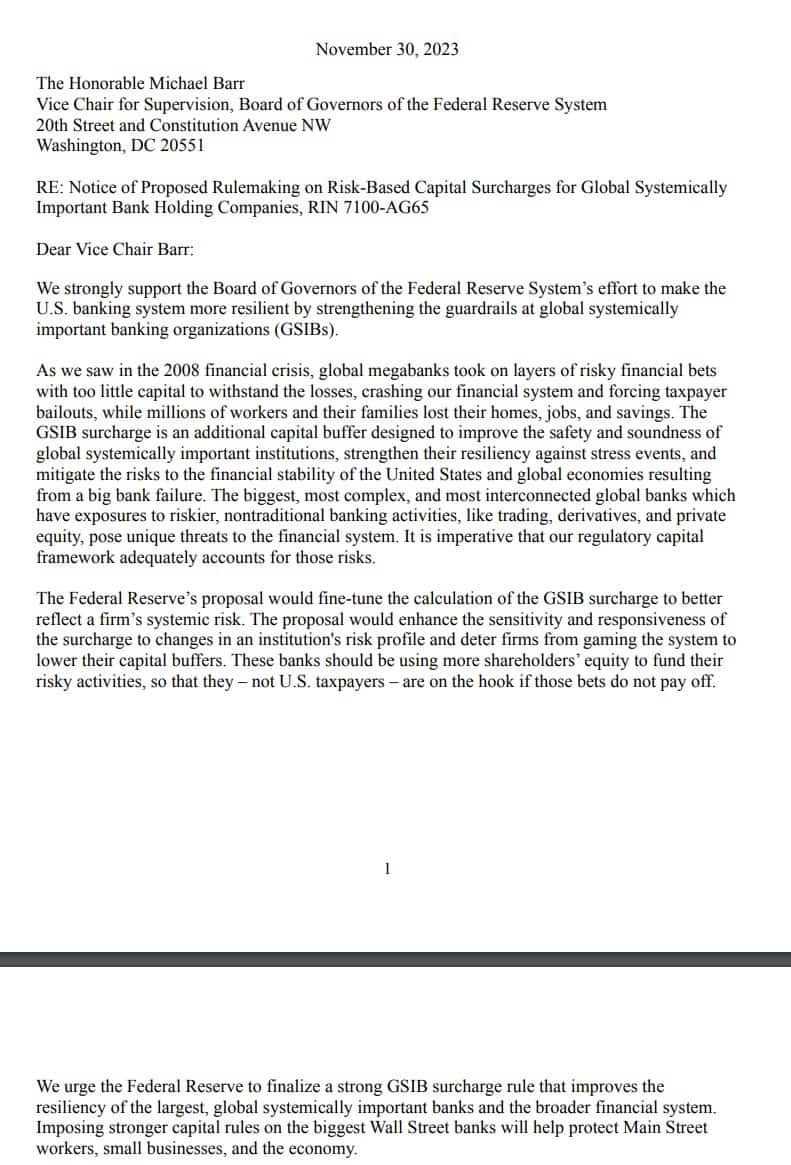Senators urge Fed to strengthen guardrails on biggest banks: "These banks should be using more shareholders’ equity to fund their risky activities, so that they – not U.S. taxpayers – are on the hook if those bets do not pay off."


We strongly support the Board of Governors of the Federal Reserve System’s effort to make the U.S. banking system more resilient by strengthening the guardrails at global systemically important banking organizations (GSIBs).
As we saw in the 2008 financial crisis, global megabanks took on layers of risky financial bets with too little capital to withstand the losses, crashing our financial system and forcing taxpayer bailouts, while millions of workers and their families lost their homes, jobs, and savings. The GSIB surcharge is an additional capital buffer designed to improve the safety and soundness of global systemically important institutions, strengthen their resiliency against stress events, and mitigate the risks to the financial stability of the United States and global economies resulting from a big bank failure. The biggest, most complex, and most interconnected global banks which have exposures to riskier, nontraditional banking activities, like trading, derivatives, and private equity, pose unique threats to the financial system. It is imperative that our regulatory capital framework adequately accounts for those risks.
The Federal Reserve’s proposal would fine-tune the calculation of the GSIB surcharge to better reflect a firm’s systemic risk. The proposal would enhance the sensitivity and responsiveness of the surcharge to changes in an institution's risk profile and deter firms from gaming the system to lower their capital buffers. These banks should be using more shareholders’ equity to fund their risky activities, so that they – not U.S. taxpayers – are on the hook if those bets do not pay off.
We urge the Federal Reserve to finalize a strong GSIB surcharge rule that improves the resiliency of the largest, global systemically important banks and the broader financial system. Imposing stronger capital rules on the biggest Wall Street banks will help protect Main Street workers, small businesses, and the economy.
“These banks should be using more shareholders’ equity to fund their risky activities, so that they – not U.S. taxpayers – are on the hook if those bets do not pay off. We urge the Federal Reserve to finalize a strong GSIB surcharge rule that improves the resiliency of the largest, global systemically important banks and the broader financial system. Imposing stronger capital rules on the biggest Wall Street banks will help protect Main Street workers, small businesses, and the economy,”

TLDRS:
- U.S. Senators Sherrod Brown, Jack Reed, Elizabeth Warren, and John Fetterman expressed strong support for the Federal Reserve's efforts to enhance the safety and soundness of global systemically important banking organizations (GSIBs).
- They urged the Fed to finalize a proposal for a stronger GSIB surcharge rule.
- The Senators emphasized that GSIBs should use more shareholder equity for their risky activities to ensure that banks, not taxpayers, bear the costs of potential failures.
- This approach aims to bolster the resilience of major global banks and the overall financial system.
- The motivation behind this support stems from the 2008 financial crisis, where global megabanks with insufficient capital undertook risky financial bets, leading to system crashes and taxpayer-funded bailouts, while causing widespread economic hardships.
- The GSIB surcharge, an additional capital buffer, is designed to enhance the safety of significant financial institutions, improve their ability to withstand financial stresses, and reduce the risks they pose to both the U.S. and global economies.
- The proposed Federal Reserve rule aims to more accurately calculate the GSIB surcharge to reflect a firm's systemic risk.
- It seeks to prevent firms from manipulating their risk profiles to reduce capital buffers and ensure they maintain sufficient equity to cover high-risk activities.
- The Senators advocate for finalizing this rule, arguing that implementing stronger capital regulations on large Wall Street banks is crucial for protecting the broader economy, including workers, small businesses, and overall financial stability.



